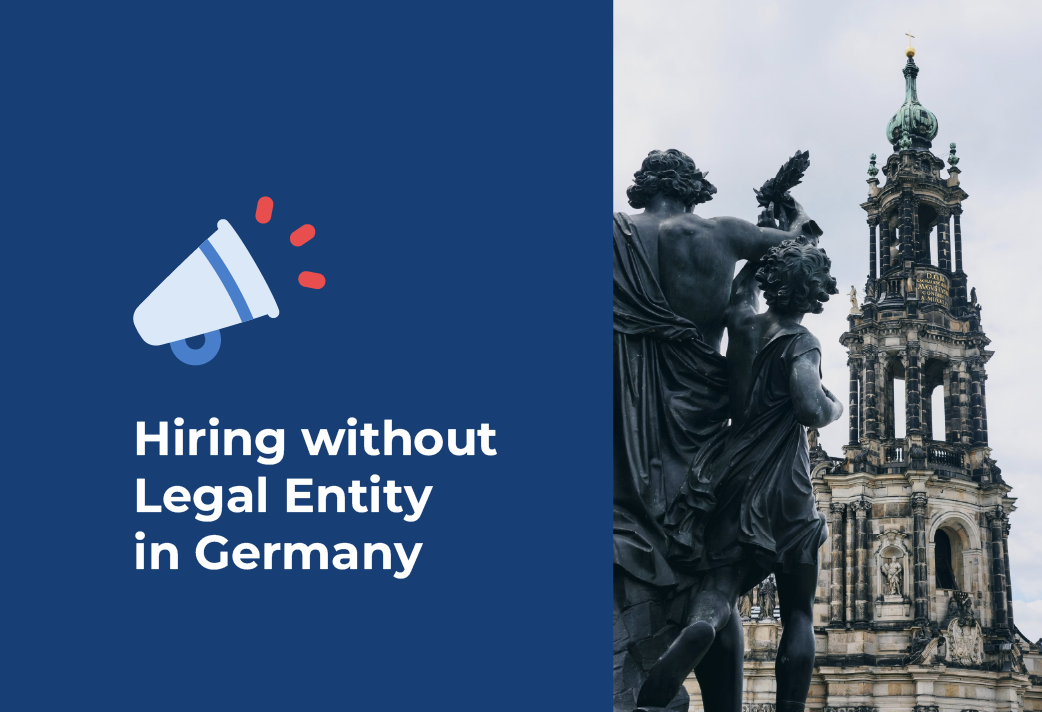Germany, as Europe’s largest economy, presents an attractive market for businesses looking to expand internationally. Traditionally, companies have had to establish a local legal entity in Germany to employ staff, but this can be a time-consuming and expensive process. Fortunately, there’s an alternative: employing without a legal entity through an Employer of Record (EOR) service.

Tired of scrolling? Download a PDF version for easier offline reading and sharing with coworkers
4 Ways to Employ Without a Legal Entity in Germany
Employer of Record (EOR) Services – An EOR is a third-party outsourcing partner that takes on legal employment responsibilities for clients. In an EOR arrangement, the EOR becomes the legal employer of chosen employees and becomes responsible for their payroll, tax, and employee benefits management. This includes ensuring compliance with all aspects of the employee’s local work status, including employment contracts, benefits, tax withholdings, and compliance with German labor laws.
Professional Employer Organization (PEO) – Similar to an EOR, a PEO co-employs the workers, sharing responsibilities. A PEO provider offers professional support with key HR functions on behalf of the client. However, unlike EORs, PEOs may require you to have a legal entity in the country or remain partially liable for employee contracts.
Independent Contractors – Hiring freelancers or independent contractors can be a quick solution to take on expert workers, but it comes with risks such as misclassification and compliance issues. In Germany, contractors are also subject to strict limits on the kind of work relationship they can have with clients, thereby restricting their usefulness on key projects or in the long term.
Staffing Agencies – These types of agencies can hire employees on your behalf and lease them to your company. While good for hiring many short-term workers quickly or managing large teams of simple employees, this can be more expensive and less integrated with your company culture or goals.
How Much Does an EOR Cost in Germany?
The cost of using an EOR in Germany varies depending on several factors, including the number of employees managed, the complexity of the employment arrangements required, and the locations of both employees and the company. Generally, EORs charge a percentage of the employee’s gross monthly salary, ranging from 10% to 20%.
However, this fee typically covers all necessary employment functions, including:
- Payroll processing
- Tax compliance
- Employee benefits management
- Legal and HR support
- Onboarding and offboarding processes
While the cost of an EOR solution might seem like an additional expense, it saves money and time compared to setting up and maintaining a legal entity in Germany. For long-term projects, this can also be the perfect way to get started quickly while being able to transfer to a new local entity over time safely.
Can an EOR Help with Compliance and Legal Issues in Germany?
Absolutely. One of the primary advantages of using an EOR is that it ensures compliance with German labor laws and regulations without any additional input from your in-house compliance team.
German employment law is known for its complexity and employee-friendly policies, including stringent rules on employee termination, mandatory benefits, and collective bargaining agreements.
An EOR can help you navigate these regulations without requiring you to be immediately familiar with all aspects of German labor laws. Expert support and industry-quality tools ensure that your employment practices are legally compliant, minimizing the risk of legal disputes, fines, and reputational damage.
Conclusion – Hire in Germany Quickly and Compliantly with INS Global EOR Services
Hiring without a legal entity in Germany is not only possible but also efficient and compliant when using an EOR like INS Global.
INS Global’s German EOR services provide a streamlined and cost-effective solution to modern expansion challenges, allowing you to focus on your core business activities while we handle the complexities of German employment law. With INS Global, you can quickly and easily expand and manage your workforce in Germany, ensuring compliance and minimizing risk.
Contact our German expansion experts today to learn more about our range of services and the options available to you when employing without a legal entity in Germany.
FAQ
Can you hire a foreign employee without a legal entity in Germany?
Yes, you can hire foreign employees in Germany without establishing a legal entity, and one of the most effective ways to do this is by using an Employer of Record (EOR). An EOR allows businesses in Germany to hire employees legally and compliantly without setting up a subsidiary or branch office.
The EOR acts as the legal employer on paper, managing all aspects of employment, including payroll, taxes, and compliance with local labor laws, while you retain control over the employee’s day-to-day activities.
Are there risks associated with employing without a legal entity in Germany?
While employing without a legal entity in Germany can be straightforward with the right EOR partner, risks include potential non-compliance with local laws if not managed correctly, cultural misunderstandings, and challenges in employee integration.
Companies seeking to transfer or move employees to Germany will also have to be aware of the processes involved with those workers properly registering in Germany, along with all the extra steps that will need to be done if they are arriving without a local employer. However, choosing a reputable EOR mitigates these risks significantly, making it important to seek out the right EOR partner.
Can I hire contractors in Germany instead of full-time employees?
You can hire contractors in Germany, but it’s essential to ensure that the contractors are genuinely independent and not misclassified employees. Misclassification can lead to legal issues and penalties, meaning this type of worker may not be suitable for every project or need.
What should I consider when hiring freelancers in Germany?
Freelancers can be the simplest way to hire talent without having a legal entity in Germany, but when hiring freelancers, you still have to ensure that their work arrangement meets the legal criteria for independent contracting. This includes factors like control over work hours, provision of equipment, and the ability to work for other clients. Clear contracts outlining the scope of work, payment terms, and intellectual property rights are crucial as Germany treats employee protections seriously.
How do I handle payroll and taxes in Germany without a legal entity?
An EOR can manage everything to do with local payroll and taxes for you. They will handle salary payments, tax withholdings, and social security contributions.
How do I pay an international employee in Germany?
While it’s completely possible to pay local employees directly from overseas, hiring through an EOR in Germany can streamline and facilitate payments to local employees, ensuring that salaries are paid in accordance with German labor laws and tax regulations. This includes handling currency conversions if needed.
What happens if there are disputes with employees hired through an EOR in Germany?
Any disputes are typically handled by the EOR, which acts as the legal employer. The EOR will follow German labor laws and dispute resolution processes, providing support to resolve any issues.
Can US companies hire foreign workers in Germany?
Yes, US companies can hire foreign workers with or without a legal entity in Germany, though worldwide taxation rates still apply for US citizens. Using an EOR simplifies the process, ensuring compliance with German labor laws and visa requirements.



SHARE